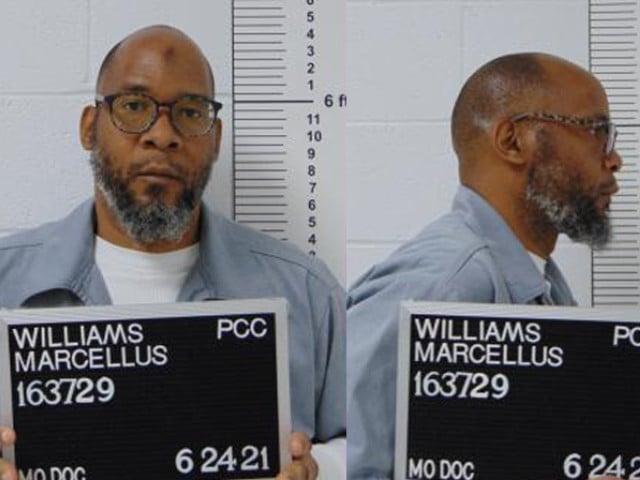
Courtesy: Missouri Department of Corrections
Marcellus Williams’s execution is slated to take place on Tuesday as planned, following the denial of requests to suspend the process by the governor and the Missouri Supreme Court.
William’s lawyer contended on Monday that the state Supreme Court ought to stop the execution because the trial lawyer had barred a black man who, in his opinion, resembled the defendant from serving on the jury. However, the court dismissed the claim.
“Despite nearly a quarter century of litigation in both state and federal courts, there is no credible evidence of actual innocence or any showing of a constitutional error undermining confidence in the original judgment,” the court stated in its ruling.
Williams is scheduled to be executed at 6 p.m. CT on Tuesday for the 1998 stabbing death of Leisha Gayle in the St. Louis suburb of University City.
Williams, 55, has asserted his innocence. But his attorney did not advance that claim before the state’s highest court on Monday, instead focusing on alleged procedural errors in jury selection and the prosecution’s alleged mishandling of the murder weapon.
Attorney Jonathan Potts, on behalf of Williams, argued that the state Supreme Court should “correct the injustice” by either declaring that the prosecutor wrongly excluded a potential juror for racial reasons or sending the case back to a lower court to determine that issue.
The office of Republican Missouri Attorney General Andrew Bailey has argued in favor of carrying out the execution. Assistant Attorney General Michael Spillane said in arguments to the state Supreme Court that the trial prosecutor has denied that he had racial motivations in eliminating potential jurors and did nothing improper—bbased on procedures at the time—bby touching the murder weapon without gloves after it had already been tested by a crime lab.
Williams had asked Republican Governor Mike Parson for clemency, primarily focusing on Gayle’s family’s desire for the sentence to be reduced to life in prison without the possibility of release. Parson, however, declared on Monday that the execution would go ahead in response to the state Supreme Court’s decision.
“Death penalty cases are among the most difficult issues we address in the governor’s office, but when it comes down to it, I follow the law and trust the integrity of our judicial system,” Parson said in a statement Monday. “Mr. Williams has exhausted due process and every judicial avenue available, including more than 15 hearings, to argue his innocence and seek to overturn his conviction. No jury or court at the trial, appeals, and Supreme Court levels has ever found merit in Mr. Williams’ claims of innocence. “Sentencing will be carried out as ordered by the Supreme Court.”
Former sheriff Parson has carried out eleven executions while in office and has never shown mercy. Parson had also been petitioned to halt the execution by the NAACP.
“The fact that Missouri is about to carry out the execution of an innocent man raises serious concerns about the credibility of the criminal justice system as a whole,” stated Tricia Rojo Bushnell, the executive director of the Midwest Innocence Project and Williams’ legal representative. “Given everything we know about Marcellus Williams’ case—including the new revelations that the trial prosecutor removed at least one Black juror because of his race and opposition to this execution from the victim’s family and the sitting Prosecuting Attorney—the courts must step in to prevent this irreparable injustice.”
Williams’ lawyers have already filed an appeal with the US Supreme Court. But in a new application filed on Monday night, lawyers representing Williams requested the US Supreme Court to stay Williams’ execution until a decision is reached on a similar case.
“This case is very similar to that of Richard Glossip, who is on death row in Oklahoma, because the state court also refused to admit the state was wrong,” the Innocence Project said in a statement Monday night. “Mr. Williams has asked the Supreme Court to stay his execution until the resolution of the Glossip case, which is scheduled for oral argument on October 9.” This will be the third execution this year in Missouri and the 100th since the state resumed executions in 1989.
Williams was less than a week away from execution in January 2015 when the state Supreme Court halted it, giving his lawyers time to conduct additional DNA testing.
He was just hours away from execution in August 2017 when then-Governor Eric Greitens, a Republican, granted a stay after reviewing DNA evidence that found no traces of Williams’ DNA on the knife used in the killing. Greitens appointed a panel of retired judges to investigate the case, but the governor left office due to an unrelated scandal, and that panel never reached a conclusion.
Questions about the DNA evidence prompted Democratic St. Louis County Prosecuting Attorney Wesley Bell to request a hearing challenging Williams’ guilt. But days before the August 21 hearing, new testing revealed that the DNA evidence had been tainted because members of the prosecutor’s office had touched the knife without gloves before the original test.
Within its decision on Monday, the California Supreme Court stated that DNA testing had in fact “undermined the prosecutor’s claim of actual innocence and fully supports the circuit court’s finding that this evidence neither shows the existence of an alternate perpetrator nor excludes Williams as the murderer.”
Midwest Innocence Project attorneys and the prosecutor’s office came to an agreement when the DNA evidence became unavailable. Williams would accept a fresh sentence of life in prison without the possibility of release in exchange for pleading guilty to first-degree murder.
The deal was approved by Judge Bruce Hilton and Gayle’s family. However, the Missouri Supreme Court rejected the agreement at Bailey’s request and mandated that Hilton hold an evidentiary hearing, which was held on August 28.
Hilton ruled on Sept. 12 that the first-degree murder conviction and death sentence would stand, noting that all of his arguments had already been rejected.
“The court has no basis to conclude that Williams is innocent, and no court has made such a conclusion,” Hilton wrote.
On Tuesday, Williams’ attorney argued that the circumstances are different because Williams’ attorney had not previously questioned the trial prosecutor in court about why he removed a specific juror.
Keith Larner, the prosecutor in the 2001 first-degree murder case, testified at an August hearing that the trial jury was fair, even though it included just one black member on the panel. Larner said he removed a potential black juror in part because he looked like Williams. He did not explain why he thought that mattered.
In a statement emailed to CBS affiliate KMOV-TV last week, Larner said his “removal of any black juror in the trial has been unanimously affirmed as race-neutral and legal by the Missouri Supreme Court in 2003 by a vote of 7-0. Bell’s/Innocence Project’s claims of improper jury selection are false.”
Bushnell told KMOV before Monday’s ruling that the August hearing was “the first time the prosecutor has had to testify under oath about his practices.”
“He admitted that race was at least in part a reason for removing the jurors,” Bushnell said. “No court has ever heard of that, and the federal court that first considered a racial discrimination claim should have had that information when making its decision. The justification previously offered for rejecting that claim is now completely refuted by these admissions made by the prosecutor himself.”
The state Supreme Court said Monday that when Larner “was specifically asked if one of the reasons for removing Juror No. 64 was that he was black, the trial prosecutor replied: ‘No. Absolutely not,'” and added that Williams’ lawyer’s argument “”selectively presents the record, ignores the circuit court’s factual findings, and provides no substantive justification for reversing this court’s previous merits determination of this claim.”
Bell released a statement on Monday saying, “The permanent punishment of execution should not be an option where there is a shadow of doubt about any defendant’s guilt, even for those who disagree on the death penalty. Not only does our office, the St. Louis County prosecutor’s office, doubt Mr. Williams’ guilt; we also doubt the validity of his conviction. We shall keep doing everything within our power to preserve his life because of these reasons.”
At Williams’ initial trial, the prosecution claimed that on August 11, 1998, he broke into Gayle’s house, heard the shower running, and discovered a big butcher knife. When Gayle, a social worker and former Post-Dispatch reporter, arrived downstairs, she was stabbed forty-three times. Both her husband’s laptop computer and her pocketbook were taken.
Authorities said Williams stole the jacket to hide blood on his shirt. Williams’ girlfriend asked him why he was wearing a jacket in the summer. The girlfriend said she later saw his purse and laptop in his car and that Williams sold the computer a day or two later. Police have said they found items belonging to Gayle in Williams’ car.
Henry Cole, who was incarcerated with Williams in 1999 on unrelated crimes, was another witness whom the prosecution used. Cole informed the prosecutors that Williams had admitted to the murder and provided information.
In response, Williams’ lawyers stated that Cole and the girlfriend had both been found guilty of felonies and requested a $10,000 prize. In a statement released on Monday, Parson said that the girlfriend “never requested the reward for information.”
How did you like this article? You can tell us by commenting. Always stay with us for information about the country and the world.




